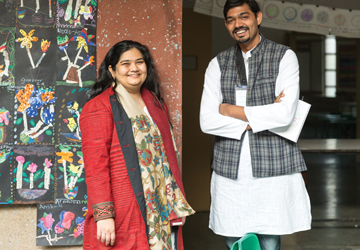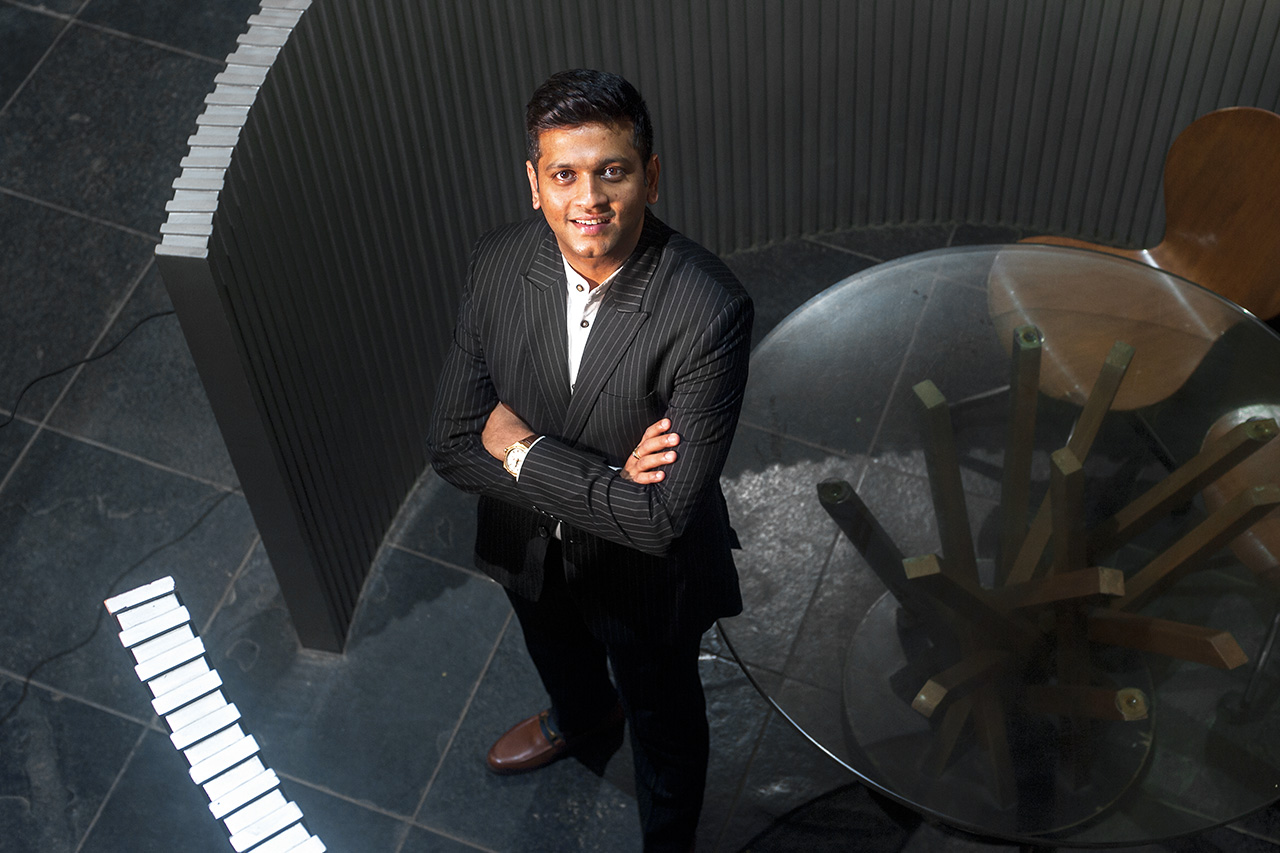
Empowering Young Minds
It was their passion for working with children and the desire to bridge the huge gaps they saw in the government schooling system that prompted Parinita Jain and Divakar Sankhla to establish the Alohomora Education Foundation in 2017. The mission was to help students from underserved communities become independent learners and give them the confidence needed to make informed life choices. “Along with the essential skills and mindsets, we also wanted to create an ecosystem of support for students by connecting them with experts for specific skill learning and mentors and organisations for learning opportunities once they finish school,” says Jain.
The duo has been immensely successful to this end and today the Foundation is supporting students like Dhanesh—who is skilling himself in design and is being mentored by design experts—and Akash—who is a part of a learning community organised by the Foundation and is building skills required to work in the fitness industry. Currently, the Foundation is working with 1,500 students from the 11th and 12th grades of 16 government schools in Delhi and Gurugram.
Catalysing change
 Jain graduated with a BBA in Finance and Strategy from the University of Michigan in 2011 and spent some time supporting her family business in Kolkata before joining the Teach for India Fellowship programme in 2012. Sankhla, on the other hand, graduated with a BTech in Electrical and Electronics Engineering from IIT Madras in 2005 and completed his MBA from IIM Lucknow in 2007. He subsequently worked for a few years with PepsiCo and later with Citibank before joining the Teach for India Fellowship programme in 2012.
Jain graduated with a BBA in Finance and Strategy from the University of Michigan in 2011 and spent some time supporting her family business in Kolkata before joining the Teach for India Fellowship programme in 2012. Sankhla, on the other hand, graduated with a BTech in Electrical and Electronics Engineering from IIT Madras in 2005 and completed his MBA from IIM Lucknow in 2007. He subsequently worked for a few years with PepsiCo and later with Citibank before joining the Teach for India Fellowship programme in 2012.
As Teach for India Fellows, Jain and Sankhla taught full-time in government schools in Delhi, with a vision to alleviate disparity in educational opportunities. Their work, however, exposed them to some harsh realities of the education sector. “If I wanted to pursue arts education when I finished school, I would have made it to one of the best colleges in the world. However, we found that such opportunities are not available to a huge population of students studying in government schools and living in some of the most densely populated urban slums of India,” reveals Jain.
Also a reason for worry was the fact that a vast majority of students dropped out or were forced to opt out of formal education after securing poor marks in their Class 12 board exams. “With lack of social capital and personal networks, they are unable to access the knowledge and career opportunities available in the 21st century,” says Jain.
The approach
 The word ‘Alohomora’ is a Harry Potter charm that means to ‘unlock things’. “Children have magic in them and our job is to create those spaces where they can continue to explore and learn—where the magic happens,” says Jain. For this, the Foundation has the Alohomora New Age Leadership Program (ANALP), a holistic youth development programme that is based on the Positive Youth Development (PYD) framework of the United States Agency for International Development (USAID).
The word ‘Alohomora’ is a Harry Potter charm that means to ‘unlock things’. “Children have magic in them and our job is to create those spaces where they can continue to explore and learn—where the magic happens,” says Jain. For this, the Foundation has the Alohomora New Age Leadership Program (ANALP), a holistic youth development programme that is based on the Positive Youth Development (PYD) framework of the United States Agency for International Development (USAID).
This means that students who are interested in arts, get to explore the world of design and graphics; students who are passionate about sports, get to develop an understanding of the fitness industry; and students with analytical skills, get to build skills useful for a career in software and coding. And they do this with the help of learning communities organised by the Foundation and by learning how to leverage the Internet safely and productively. Jain adds, “The curriculum is designed in such a manner that children can self-facilitate the learning shared on the Internet [uploaded on EkStep, a digital platform that addresses learning challenges in the education space] for free dissemination.”
When the youth give back
 The Foundation also runs an extensive recruitment and selection drive to identify motivated youth, who have the resilience to take charge of their own learning and also want to give back to their communities. These youth, aged between 18 and 23 years, are pursuing graduation from an open university, or are fresh graduates. They are trained by the Foundation to become Community Leads. After their training is complete, they act as facilitators to enable students to take up independent Career Action Projects aligned to the students’ interests and strengths.
The Foundation also runs an extensive recruitment and selection drive to identify motivated youth, who have the resilience to take charge of their own learning and also want to give back to their communities. These youth, aged between 18 and 23 years, are pursuing graduation from an open university, or are fresh graduates. They are trained by the Foundation to become Community Leads. After their training is complete, they act as facilitators to enable students to take up independent Career Action Projects aligned to the students’ interests and strengths.
Traversing the course
Jain says the journey has been fraught with challenges, and one of the biggest hurdles has been to turn the education sector’s attention towards this age group. “Typically, in our country’s education system, students studying in grades 9-12 are expected to focus only on their board exams,” says Jain. “This is unfortunate because the job market has transformed entirely and what children study in schools is actually irrelevant to what our world needs the youth to contribute towards.” As a result, the Foundation’s progressive and unique learning programme gets perceived as an extra-curricular activity that should not be given priority in the face of examinations. “This limits our time with the students and in turn the scope of how much they can achieve and alter their life paths by using their school time meaningfully,” says Jain.
Students’ socio-economic conditions also pose a challenge, since it leaves them with little time to focus on their learning. Jain reveals, “The students that we work with juggle multiple familial responsibilities, from taking care of household work and younger siblings to helping out to support the family income. Moreover, once they finish 12th grade, there is tremendous pressure on girls to get married and on boys to start earning a full-time income, which prevents them from focusing on building a skill that can lead to aspirational careers.”
While the relationships that the Foundation has built with people from the education sector and other walks of life who believe in its mission have definitely helped, what has helped it to rise to every challenge is its team of nine full-time members and 20 community leads who work 25 hours a week to execute its programme in partner schools.
Future plans
 In mid-2016, the Foundation received a one-time grant of USD 20,000 from Google India. Its collaborative, peer-learning based programme was also recognised as one of six top ideas globally for ‘Rethinking Education’, by the World Bank Group Youth Summit 2016.
In mid-2016, the Foundation received a one-time grant of USD 20,000 from Google India. Its collaborative, peer-learning based programme was also recognised as one of six top ideas globally for ‘Rethinking Education’, by the World Bank Group Youth Summit 2016.
Currently, the Foundation is supported by N/Core Tech and Unltd India. It is also part of the TFIx – Teach For India cohort that runs an incubator to nurture leaders who will educate every child in every corner of India. The Foundation is fundraising for 2019-20 and is looking at long-term funding partnerships in the coming years.
When asked about future plans, Jain replies, “We are planning to expand to another tier-2 city and are thinking deeply about how to leverage technology to bring our programme to more students—our curriculum is already hosted on EkStep,” and signs off.









